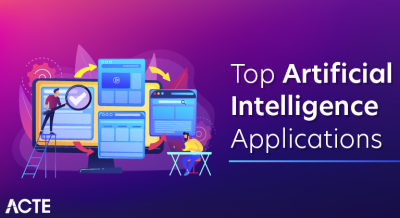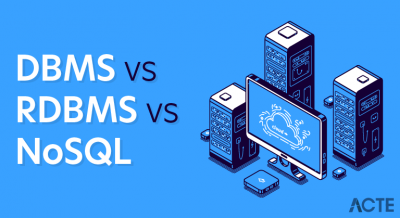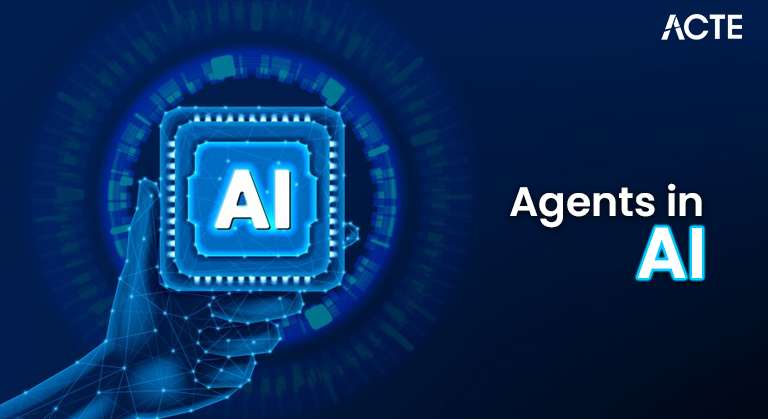
- Introduction to AI Agents
- What is an Agent in AI?
- Types of AI Agents – Overview
- Comparison of AI Agents
- Real-World Applications of AI Agents
- Challenges in AI Agent Development
- Conclusion
In Artificial Intelligence, agents are entities that perceive their environment through sensors and act upon it using actuators to achieve specific goals. There are several types of agents, each designed with varying levels of complexity and autonomy. Simple reflex agents respond to current percepts with predefined rules, while model-based reflex agents maintain an internal state to make more informed decisions, concepts that are better understood through Data Science Training. Goal-based agents take actions based on a desired outcome, and utility-based agents choose actions that maximize a utility function, balancing different goals and preferences. Finally, learning agents improve their performance over time by learning from experiences. Understanding these agent types is essential for designing intelligent systems that can operate effectively in dynamic and complex environments.
To Earn Your Data Science Certification, Gain Insights From Leading Data Science Experts And Advance Your Career With ACTE’s Data Science Course Training Today!
Introduction to AI Agents
Artificial Intelligence (AI) agents are systems designed to operate autonomously or semi-autonomously, interacting with their environment to achieve specific goals. These agents use sensors to perceive their surroundings, make informed decisions based on this input, and take appropriate actions through actuators or computational processes, highlighting the importance of understanding the distinction between Data vs Information in intelligent systems. AI agents play a crucial role in various applications such as robotics, video games, autonomous vehicles, and virtual assistants. In the context of AI, an agent is any entity that can observe its environment and act in a way that improves its chances of success in completing a task.
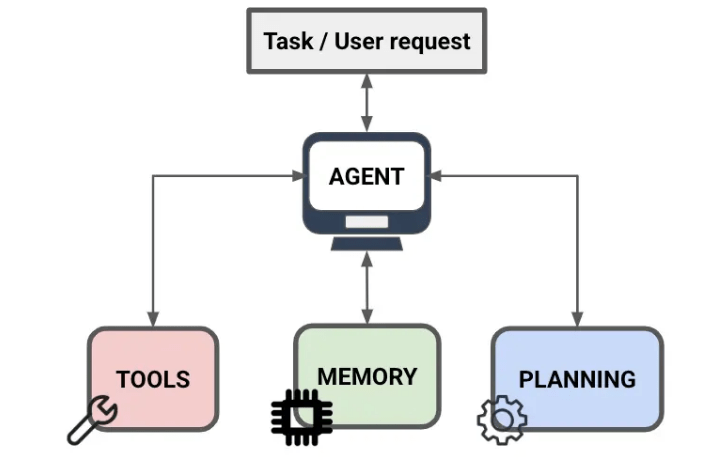
The behavior of an AI agent depends on its design ranging from simple, rule-based systems to complex, learning-driven models. Some agents act purely on pre-programmed instructions, while others adapt and learn from experience. Understanding the different types of AI agents and their capabilities is essential for grasping how intelligent systems function and how they can be leveraged to solve complex, real-world problems efficiently and effectively.
What is an Agent in AI?
- Definition: An agent in AI is an entity that perceives its environment through sensors and acts upon that environment using actuators to achieve specific goals.
- Autonomy: AI agents can operate autonomously or semi-autonomously, making decisions without direct human intervention.
- Perception and Action: Agents continuously sense their environment, process the input, and perform actions based on their internal logic or learned behavior.
- Goal-Oriented: Agents are typically designed to achieve certain objectives or maximize performance measures, such as reaching a destination or solving a problem, and understanding tools like How to Use the Percentage Formula in Excel can assist in evaluating and analyzing these performance metrics effectively.
- Learning Capability: Some agents can learn from experience and adapt their behavior over time to improve performance in dynamic environments.
- Applications: AI agents are widely used in areas like robotics, autonomous vehicles, virtual assistants, gaming, and recommendation systems.
- Environment Interaction: The effectiveness of an agent depends on how well it interacts with its environment and adapts to changes or uncertainties.
- Types of Agents: Common types include simple reflex agents, model-based reflex agents, goal-based agents, utility-based agents, and learning agents, each with varying complexity.
- Finance: AI agents are used in algorithmic trading, fraud detection, and risk assessment. These agents analyze vast amounts of financial data to make optimal decisions.
- Autonomous Vehicles: Self-driving cars are powered by goal-based agents that plan and execute driving strategies, considering real-time traffic and road conditions, which highlights the significance of Artificial Intelligence Present and Future in shaping autonomous technologies.
- Customer Support: AI-powered chatbots and virtual assistants are learning agents that engage with users, provide support, and improve their responses over time.
- Robotics: AI agents control robots in manufacturing, agriculture, and healthcare. For instance, robots in a factory might use goal-based or utility-based agents to optimize their assembly line tasks.
- Healthcare: AI agents assist in diagnosing diseases, personalizing treatments, or controlling medical devices. Learning agents are beneficial here as they can adapt and improve based on patient data.
Are You Interested in Learning More About Data Science? Sign Up For Our Data Science Course Training Today!
Types of AI Agents – Overview
Simple Reflex Agents
Simple reflex agents are the most basic form of AI agents. They operate based on predefined rules that link specific stimuli (perceptions) with actions. These agents don’t have a memory of past events and don’t reason about the world. Instead, they react directly to the current state of the environment. For example, a simple reflex agent might be used in a thermostat system that responds to temperature.
Model-Based Reflex Agents
Model-based reflex agents improve over simple reflex agents because they maintain an internal model of the world. This allows them to make decisions based on the current state of the environment and the history of past events. These agents use this internal model to make informed decisions about future actions, similar to how Data Validation in Excel ensures accurate and consistent input for better decision-making. For instance, a model-based reflex agent might be used in a robot that cleans a room.
Goal-Based Agents
Goal-based agents are more sophisticated than reflex agents because they decide by considering future goals. These agents do not only react to the current state but actively plan actions to achieve specific objectives. They can simulate potential future states and choose the actions leading to the desired goal. For example, a self-driving car could use a goal-based agent to navigate traffic and reach its destination. The agent would analyze its surroundings, assess potential routes, and choose the best path to achieve the goal.
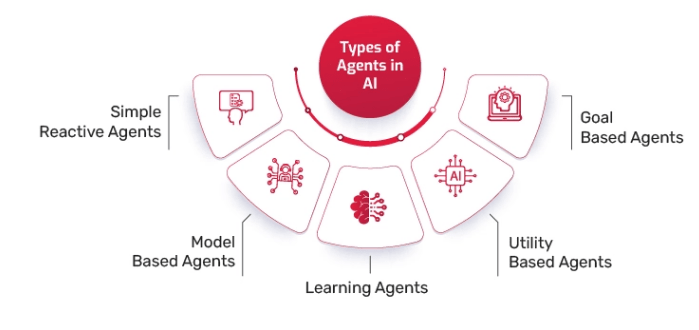
Utility-Based Agents
Utility-based agents go a step further than goal-based agents by considering whether a goal is reached and evaluating the desirability of various states. Instead of aiming to achieve a single goal, these agents optimize actions by choosing the one that maximizes their utility, a measure of satisfaction or benefit derived from an outcome. For instance, an AI agent in an e-commerce platform might recommend products based on the utility of maximizing user satisfaction, factoring in preferences, prices, and reviews.
Learning Agents in AI
Learning agents are designed to improve their performance by learning from experience. These agents execute actions based on predefined rules or goals and adapt their behavior based on feedback from the environment. Machine learning is typically used to enhance the capabilities of these agents, allowing them to modify their strategies based on new information. For example, in video games, AI agents controlling non-player characters (NPCs) can learn new techniques as they interact with the game environment and human players, making the game more dynamic and challenging.
Comparison of AI Agents
Data Science Training provides a strong foundation for understanding AI agent architectures and their decision-making processes. Here’s a brief comparison of the different types of AI agents based on their complexity, adaptability, and decision-making processes:
| Type of Agent | Complexity | History | Decision Making | Adaptability |
|---|---|---|---|---|
| Simple Reflex Agent | Low | None | Predefined rules | Low |
| Model-Based Reflex Agent | Medium | Partial (Internal Model) | Based on model and rules | Medium |
| Goal-Based Agent | High | Yes (Goal-Oriented) | Planning-based | High |
| Utility-Based Agent | Very High | Yes (Utility Optimized) | Maximizes utility | Very High |
| Learning Agent | Very High | Yes (Learns from Experience) | Learns and adapts | Very High |
Each type of agent has its strengths and weaknesses, and the choice of which to use depends on the complexity of the problem and the environment in which the agent operates.
Looking to Master Data Science? Discover the Data Science Masters Course Available at ACTE Now!
Real-World Applications of AI Agents
AI agents are used in a wide range of industries and applications. Some notable examples include:
Challenges in AI Agent Development
Despite the vast potential of AI agents, several challenges remain in developing effective systems. One of the primary obstacles is the complexity of real-world environments, which are dynamic and often uncertain. AI agents must navigate these ever-changing conditions, making it difficult for them to act reliably in every situation. Additionally, learning efficiency is a concern, as learning agents require massive amounts of data and computational resources. Even with this input, they may struggle to generalize their knowledge to new or unseen scenarios, which is where techniques like Bayesian Networks in AI can help model uncertainty and improve decision-making in unfamiliar situations. Ethical issues also arise, particularly in sensitive areas like healthcare and finance, where the use of AI agents can raise concerns about data privacy, fairness, and accountability. Scalability is another significant challenge; scaling AI agents to handle more complex tasks or larger environments demands substantial computational power and advanced algorithms. Finally, there’s the issue of autonomy vs. control, as it’s crucial to find the right balance between allowing agents to make autonomous decisions and ensuring human oversight, especially in safety-critical applications where errors can have serious consequences. Addressing these challenges is key to advancing AI agent technology.
Go Through These Data Science Interview Questions & Answer to Excel in Your Upcoming Interview.
Conclusion
AI agents have already begun to transform industries by offering more innovative, efficient, and autonomous solutions. In fields like autonomous vehicles, healthcare, and customer support, these agents are enabling advancements that improve operational efficiency and user experiences. Despite the progress, challenges remain in areas such as learning, adaptability, and ethics. Developing AI agents that can learn effectively from limited data, adapt to new situations, and operate ethically in complex environments is an ongoing focus of research, and Data Science Training plays a vital role in equipping professionals with the skills to contribute to this advancement. However, the future of AI agents looks promising, with breakthroughs in machine learning, reinforcement learning, and natural language processing paving the way for even more capable systems. As AI agents become increasingly sophisticated, they are expected to play a crucial role in shaping industries, enhancing productivity, and improving quality of life. With their growing ability to handle complex tasks and interact with humans seamlessly, AI agents will continue to evolve, helping industries adapt to the fast-paced demands of the modern world.



